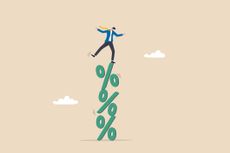Five Reasons to Take Social Security Early (and Four Reasons to Wait)
Are there good reasons to take Social Security early? While many experts say it's best to wait until full retirement age to claim benefits, here are some reasons to start early.


A record number of people will retire in 2024, with four million Baby Boomers turning 65. Although experts say it's often better to wait until full retirement age to claim your Social Security benefits, you may feel the reasons to take Social Security early outweigh the disadvantages.
The Social Security program began during the Great Depression as a form of social insurance to address ongoing poverty rates among senior citizens. The Social Security Act, part of Roosevelt's New Deal, was enacted on August 14, 1935, when lawmakers set the retirement age at 65. It stayed that way until Congress overhauled the system in 1983 and gradually raised the full retirement age to 67 for those born in 1960 or later.
About 27.3% of working Americans claimed Social Security benefits at age 62, according to a Bankrate survey that analyzed 2022 claims. Just over 13% took Social Security at age 65, when many born before 1960 hit full retirement age, while 24.7% took it at age 70, when the monthly benefit can no longer be increased by waiting.

Sign up for Kiplinger’s Free E-Newsletters
Profit and prosper with the best of expert advice on investing, taxes, retirement, personal finance and more - straight to your e-mail.
Profit and prosper with the best of expert advice - straight to your e-mail.
So, what is the best age to file for benefits, and when does it pay to take Social Security benefits early?
Reasons to take Social Security early
1. Health issues
You are eligible to collect your full retirement benefit — 100% of the amount you’re entitled to receive based on lifetime earnings — at full retirement age (FRA). Full retirement age varies based on when you were born. The most recent age group to reach FRA were those born in 1957, as they turned 66 and 6 months in 2023. The FRA increases gradually to age 67 for people born between 1957 and 1960. FRA is 67 for all people born in 1960 and later.
However, if you’re in poor health, you may fear you won’t reach full retirement age and decide to take your benefits early instead. This may be especially true if you’re single and don’t have to worry about the impact on your surviving spouse.
2. You no longer want to work
It's not hard to believe that the average person spends 13 years and two months at work during their lifetime, according to the HuffPost. If you have a physically taxing job, it may seem even longer. A 2023 study by the Economic Policy Institute revealed that one in two workers over age 50 work in unhealthy or hazardous conditions, or have jobs that are physically draining. If this is the case, you may no longer be willing or able to work, and instead of remaining on the job, may choose to draw Social Security early.
3. You need cash now
With the rising cost of living, you may decide to claim your Social Security benefits early. From 2008 to 2009, nearly 36% of eligible men and 39% of eligible women started claiming benefits at age 62 for one simple reason — to pay the bills.
4. You need to cover expenses and get out of debt
It’s possible your current living expenses may surpass your Social Security benefit amount, so you decide to take your benefits early because you can’t wait for a larger payout later. Or, you’re drowning in debt, and taking benefits now will help. You may also feel you could do better by collecting your benefits early and investing that money. While that may appear logical, your investment must beat the 6% to 8% guaranteed return on your money that Social Security provides if you retire at full retirement age.
5. You fear benefits will dry up
The world is changing, and you may simply fear that Social Security benefits won’t be around when you reach full retirement age. This may be true even if you understand you’ll receive a larger benefit if you delay claiming social security. Fear can be a driver in decisions, and if this is you, claiming benefits early may be practical.
Reasons not to take Social Security early
In contrast to all the reasons to take Social Security early, there are also several reasons to wait.
1. Benefits are permanently reduced
The earliest age you can start taking Social Security retirement benefits is 62. But, your Social Security benefits are reduced by 30% if you retire at 62. That means you will receive just 70% of your full retirement benefit every month for the rest of your life.
2. Smaller cost-of-living adjustments
By taking your Social Security benefit early you will receive a smaller monthly benefit than waiting until your full retirement age. You will also get less from future Social Security cost-of-living adjustments (COLA). For instance, the earnings limit for people who have not reached their “full retirement age” in 2024 is $22,320. On the other hand, the earnings limit for people reaching full retirement age in 2024 is $59,520.
3. Penalty for working
The money you earn from a job before reaching full retirement age can affect your Social Security benefits. In 2023, Social Security deducted $1 from benefits for each $2 earned over $22,320. If you turn full retirement age, Social Security deducts $1 from benefits for each $3 earned over $59,520 until you turn the full retirement age. Although you will get your money back after you reach full retirement age, you won’t have as much to spend in the meantime.
4. Maximizing spousal benefits
If you’re married, you may want to consider how claiming Social Security early will affect your spousal benefits. First, when you file for retirement benefits, your spouse is typically eligible for a benefit based on your earnings, which can be half of your primary benefit amount — depending on your age at retirement. So, if your spouse begins receiving benefits before "normal (or full) retirement age," they will receive a reduced benefit.
Bottom Line
When it comes to Social Security, there are pros and cons to taking your benefits early. While it can cover expenses now and come in handy if you're not in the best of health, Social Security is not meant to replace the income you earn from a job. In fact, Social Security benefits typically only amount to about 40% of your average earnings, and if you file early, you’ll be permanently locked into a lower benefit.
One last thing. Before making any final decisions about taking your Social Security benefits early or postponing them until later, consider consulting with a financial adviser who can help you determine the best option for your financial needs.
Related Content

To continue reading this article
please register for free
This is different from signing in to your print subscription
Why am I seeing this? Find out more here
Get Kiplinger Today newsletter — free
Profit and prosper with the best of Kiplinger's advice on investing, taxes, retirement, personal finance and much more. Delivered daily. Enter your email in the box and click Sign Me Up.

For the past 18+ years, Kathryn has highlighted the humanity in personal finance by shaping stories that identify the opportunities and obstacles in managing a person's finances. All the same, she’ll jump on other equally important topics if needed. Kathryn graduated with a degree in Journalism and lives in Duluth, Minnesota. She joined Kiplinger in 2023 as a contributor.
-
 Best Closed-End Funds (CEFs) to Buy Now
Best Closed-End Funds (CEFs) to Buy NowThe best closed-end funds will significantly boost your portfolio income and allow you to buy their underlying stocks and bonds at a discount.
By Charles Lewis Sizemore, CFA Published
-
 Stock Market Today: Markets Hover Near Record Highs on Powell Testimony
Stock Market Today: Markets Hover Near Record Highs on Powell TestimonyStocks were little changed on light volume as the Fed chief testified before Congress.
By Dan Burrows Published
-
 How to Organize Your Financial Paperwork for Your Heirs
How to Organize Your Financial Paperwork for Your HeirsA guide to organizing your financial paperwork so heirs have any easier time getting affairs in order.
By Ella Vincent Published
-
 8 Great Places for Snowbirds to Land
8 Great Places for Snowbirds to LandThese affordable warm-weather cities for snowbirds offer plenty of housing options, abundant activities for retirees and access to good health care.
By Sandra Block Published
-
 Why Do People Retire in Florida? 9 Things You Must Know
Why Do People Retire in Florida? 9 Things You Must KnowAttention Florida-bound retirees: There's more to the Sunshine State than Disney, golf and beaches.
By Bob Niedt Published
-
 How Interest Rates Affect Annuities
How Interest Rates Affect AnnuitiesFind out why higher interest rates benefit some annuities more than others.
By David Rodeck Published
-
 How to Use Annuities for Retirement Paychecks
How to Use Annuities for Retirement PaychecksPredictable income can provide stability and peace of mind. Here’s how to decide whether an annuity is right for you — and sort through the options.
By David Rodeck Published
-
Are You Confident About Your Finances? Many Americans Are
More than 60% of Americans feel they are in better shape to reach their financial goals than the generations that came before them, according to a 2024 Schwab Survey
By Kathryn Pomroy Published
-
How to Get the Most Out of Your Pension
If you’re expecting a pension when you retire, your decisions on how it’s distributed could have long-term effects on your financial security.
By Sandra Block Published
-
 Widows Share Their Financial Strategies
Widows Share Their Financial StrategiesWidows discuss what helped - and would have helped - with finances and documents after their spouses' deaths.
By Janet Bodnar Published

